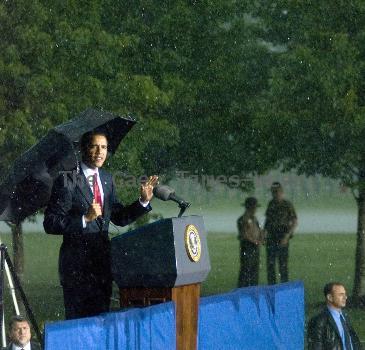Despite oil spill and mortgage fiasco, anti-government mood hampers tougher regulations
By Charles Babington, APMonday, August 2, 2010
Anti-government mood stifles regulatory push
WASHINGTON — Public distrust of government is limiting the push for tighter federal regulations even in the wake of regulatory lapses that contributed to the financial meltdown, the oil spill in the Gulf of Mexico and April’s deadly coal mine explosion.
These disasters would seem likely candidates for nudging the public’s appetite for regulation, which typically ebbs and flows, toward the pro-oversight side.
But notwithstanding a financial overhaul bill that squeaked through Congress, Republicans still rail against government regulation as if the home-loan catastrophe and BP oil spill never happened. Democrats, meanwhile, often tiptoe around the subject, fearful of being labeled anti-free enterprise.
The reason, Democrats and government analysts say, is that the public’s desire for better regulations to protect consumers is trumped by a stronger dislike of the only power that can reasonably conduct such efforts: the government.
“People’s trust in government is appallingly low,” said Matt Bennett of Third Way, a Democratic-leaning group that researches numerous issues.
At best, Americans seem conflicted about government regulation. In a new Bloomberg poll, a plurality of respondents said they have become more supportive of tougher regulations in recent months. Still, barely more than a third said there should be more government oversight in general, while the rest wanted less regulation or about the current amount.
Moreover, most major regulations must come from Congress, which gets an unfavorable rating from nearly three out of every four Americans, according to a recent Associated Press-GfK poll.
Consumer advocates say these attitudes help explain why there wasn’t louder support for new regulations to prevent a repeat of, say, the subprime mortgage collapse. It helped trigger a near-depression in 2008 and 2009 that trimmed $17 trillion from Americans’ net worth.
Tougher government oversight at numerous points might have averted much of the damage: Preventing home loans from going to people with virtually no chance of repaying them; barring lenders from immediately selling loans so they would profit even if the borrower quickly defaulted; and vetting the packaging of subprime loans into complex products sold to thousands of investors who lost billions of dollars.
Despite such gaps in consumer safeguards, the Obama administration plays down the regulatory aspects of the new financial oversight law.
“The basic strategy in this reform bill does not rest on the wisdom of regulators,” says Treasury Secretary Tim Geithner.
“It’ll help consumers make better choices with better disclosure,” he said, and enable the government “to put in place strong constraints on risk-taking on all the nation’s largest institutions.”
The new law also creates a Consumer Financial Protection Bureau and a Financial Stability Oversight Council.
In his 1,500-word speech when he signed the measure into law, President Barack Obama made only one direct reference to government regulation. “For these new rules to be effective,” he said, “regulators will have to be vigilant.”
Meanwhile, Republican candidates, lawmakers and their allies continue to bash government regulations in general, as they have for years. Anti-regulation feelings run especially high among tea party activists.
In Nevada, GOP Senate nominee Sharron Angle says businesses are clinging to their cash because “they can’t see through the fog of taxation and regulation at the government level.”
Kentucky’s Republican Senate nominee, Rand Paul, stumbled early when he suggested the 1964 Civil Rights Act — which forced restaurants and other businesses to admit black customers — was an overreach of regulatory powers.
The U.S. Chamber of Commerce said the White House has “vilified industries while embarking on an ill-advised course of government expansion, major tax increases, massive deficits and job-destroying regulations.”
Robert Weissman, president of Public Citizen, said he found it “quite remarkable that the Chamber feels it’s time to start a new anti-regulation campaign,” because the Wall Street meltdown, Gulf oil spill, Toyota car recall and April 5 coal mine explosion, which killed 29 men in West Virginia, were “all directly tied to inadequate regulation.”
With Democrats soft-pedaling their embrace of tougher regulations, the public remains divided and pessimistic. Nearly four in five of those polled by Bloomberg said they have just a little or no confidence that the new finance law will prevent or significantly soften a future crisis, or make their personal assets more secure.
Tags: Accidents, Barack Obama, Environmental Concerns, Government Regulations, Industry Regulation, North America, United States, Washington

